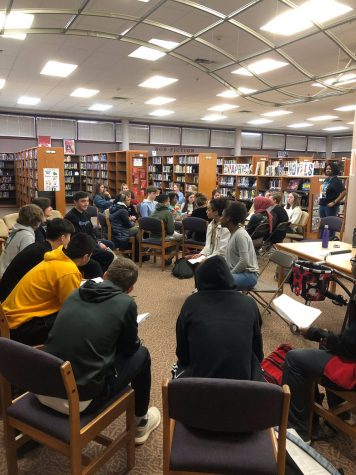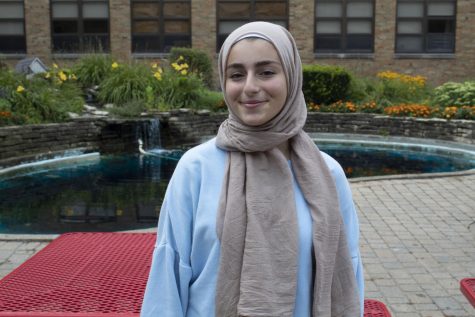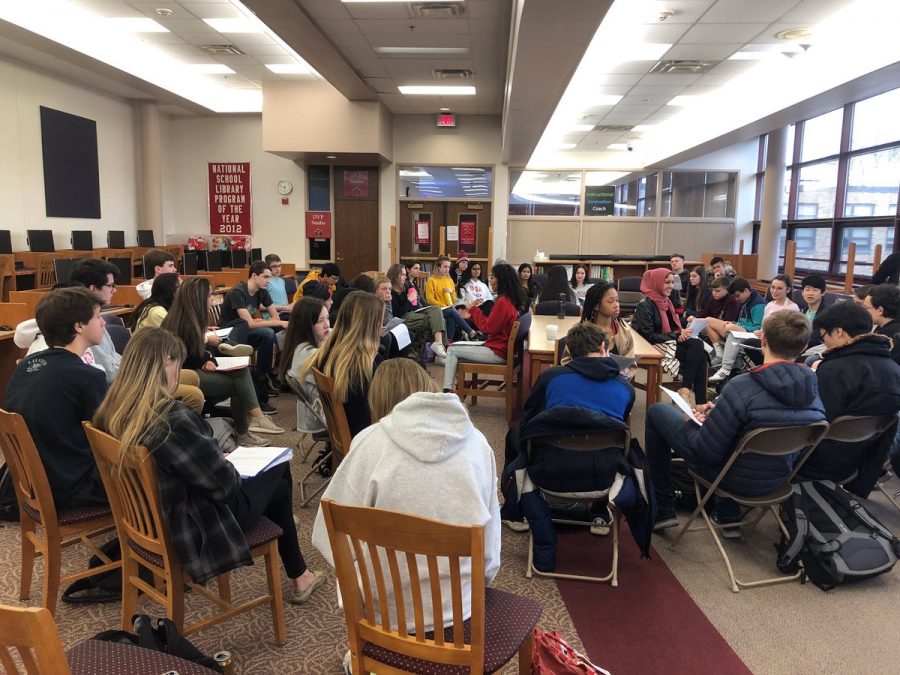Students discuss microagressions at town hall meeting
Courtesy of @HCHSActivities Twitter
In the town hall meeting on Wednesday, Feb. 27, student groups discussed racism and microaggressions.
On Wednesday, Feb. 27, a town hall meeting was held in the library, where students and classes discussed microaggressions with a panel of students and faculty who took part in planning Black History Month events.
This year’s town hall theme was “otherness,” meaning that the people on the panel were students that felt “other” in the school. The panel who led the discussions on “otherness” and microaggressions consisted of students who identified as being biracial, LGBTQ, or having a disability.
Microaggressions are the everyday verbal, nonverbal, snubs, or insults, whether intentional or unintentional, which communicate hostile, derogatory, or negative messages to target people based solely upon their marginalized group membership.
“I was hesitant at first to join the panel because even though my dad is Indian, I didn’t know if I would be able to relate to the other panelists’ experiences,” said Tara Tekkey, senior panel member. “But, I decided to do it anyway because I wanted to be more involved in making the school a more open and friendly space for every student.”
The town hall began with a group of four to five panel members conversing in front of classes for approximately 15 minutes about their own experiences with discrimination and inclusion at Central. Afterward, the group took questions from the student audience and then grouped them into small groups to further discuss and educate audience members about microaggressions.

Student panel members led the discussions by talking about their own experiences with discrimination at Central, and then opened up the discussions to the student audiences.
“I think my favorite part was when you could see some people clearly engaging. Yes, there were a few kids who didn’t take it seriously and would ask me intentionally bad questions, but even then I would take the chance to discuss with them and give them a real answer,” said Parker Martinez, senior panel member.
A common obstacle that panel members faced while preparing for the town hall meetings was gathering the confidence to speak in front of their peers about the unspoken racial tensions of high school.
“I’m not going to lie, it was really terrifying to even think about going up to talk for me, but my teacher was so enthusiastic and helped me tremendously when it came to gaining confidence,” Martinez said. “Around the third time speaking to a class I felt way more at ease, and all the other people participating were so friendly, which made it easy.”
Even though the panel experienced a few instances where other students complained about the topics discussed and the validity of some of the microaggressions, the town hall was generally well-received by students and faculty for how it encouraged discussion about microaggressions and inclusion.
“I learned about the daily racist encounters my peers face in life and at school, and how the offenders usually don’t usually have bad intentions. [They] are unknowingly being extremely racist and discriminatory which really sticks with those receiving the comments,” said Payton Stifflear, junior who attended the town hall. “My favorite part was seeing some familiar faces on the panel because I was able to hear about their hardships.”
Although the panel members didn’t expect students in the audience to be fully attentive or whole-heartedly agree with individual viewpoint’s that were discussed, the speakers said they hope that students and faculty will be more open-minded and understanding in regards to acts of discrimination after attending the town hall.
“Some things I heard a lot was, ‘I wouldn’t get offended by that,’ or ‘this just makes it worse because now I’m hyper-aware,'” Martinez said. “First, I recognize that some things we used an example of an offense may not offend everyone. But just because it doesn’t hurt you, does not mean it won’t affect someone else. As for the second part, it can be a good thing to be hyper-aware. Maybe you’ll realize some things you’ve said can come off as insensitive, or that you’re ignoring problems that exist for the sake of being correct. And ignorance is not fixing anything.”
The town hall was United Club’s last event to commemorate Black History Month during February.

Lana Jawich is a senior writer for Devils' Advocate who enjoys painting and playing soccer. When she’s not annoying her siblings or spacing out in physics,...











